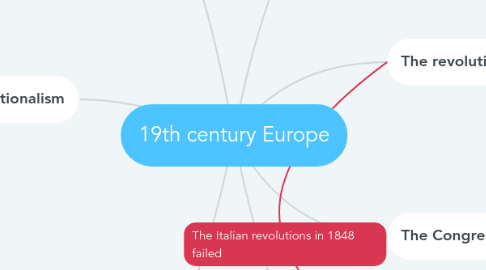19th century Europe
por Sophia Vial


1. Liberalism
1.1. New Middle class believed it stood for freedom of the individual and equality of all before the law - the concept of government by consent, aka democracy
1.2. The end of autocracy and clerical privileges
1.3. Freedom of markets, abolition of state-imposed restrictions and creation of network of railways
1.3.1. Economic nationalism
2. Nationalism
2.1. National identity emerged during the french revolution and upsurged during the industrial revolution.
2.1.1. In the 1800s, information about the country was easily accessible because of the new axes of communication which made people feel like they were part of the nation; children went to school where they could learn about the history of the country; and there was a feeling of pride for the nation and competition between others because society was based on continuous development.
2.2. Nationalism developed through wars and territorial expansion - the feeling of superiority and competition grow when in a country is in a conflict with another
2.3. And developed through art, songs and poetry
2.3.1. Example:
2.4. Effects : sense of belonging and hatred of others - Nazism stemed from a feeling of superiority and a great hatred for others
3. German Unification
3.1. Prussia became the leader of Germany's national unification and Prussia's King was proclaimed German Emperor in Versaille after the unification
3.2. Created a politically and administratively integrated state by uniting the different German regions
3.3. The unified nation-state of Germany modernized it's currency, banking, legal and justice system
3.4. The unified nation-state of Germany modernized it's currency, banking, legal and justice system.
4. The Napoleonic rule 1799-1815
4.1. Introduced ideas of liberty and freedom
4.2. The birth of nationalism - a united community with equal rights, uniform laws and a common language
4.3. Brought the French language and ideas of nationalism to other countries
4.4. Push-back from European leaders who didn't want to loose their power
5. The revolutions 1830 - 1848
5.1. Causes: industrialisation which led to unemployment, hunger and epidemics ; liberalism ; nationalism and economic crisis
5.2. Led by liberal-nationalists
5.3. Started in France in 1830 when the absolute monarchy was overthrown by the liberals and a constitutional monarchy was put in place
5.3.1. The rest of Europe followed
